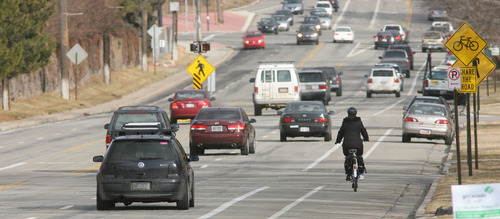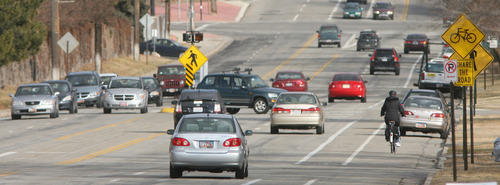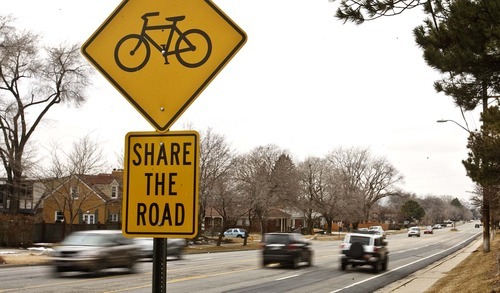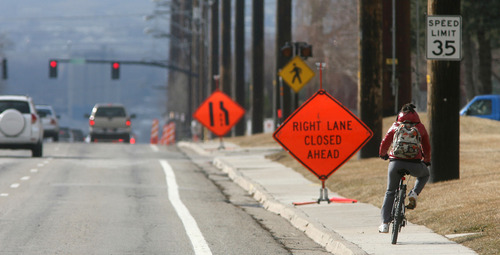This is an archived article that was published on sltrib.com in 2012, and information in the article may be outdated. It is provided only for personal research purposes and may not be reprinted.
East-bench angst is ballooning over Sunnyside Avenue's "road diet," and now a war of words between Mayor Ralph Becker and the Salt Lake City Council has scuttled the six-week test.
Initially planned to start this month, the experiment sought to replace one westbound lane of traffic between Guardsman Way and Foothill Drive — and perhaps an eastbound lane later — with a bicycle lane.
Residents who rely on the east-west corridor went berserk, complaining that slimming the thoroughfare would spray cars into their neighborhoods, jeopardizing child safety. It is "patently irresponsible," they argued, to squeeze the east bench's primary artery to downtown.
"We in these neighborhoods are going to be left with the disaster," resident Loree Hagen told the council.
Similar protests and more than 100 angry emails prompted new Councilman Charlie Luke to pen Becker a letter, calling instead for keeping four traffic lanes but eliminating the center turn lane. Pointing to "a lot of unnecessary controversy," the missive was signed by three other council members, making a voting majority.
"This option would benefit Sunnyside residents by creating a 'complete street,' " the letter reads. It would provide space for expanded and safer bike lanes, give east-siders who rely on Sunnyside access to downtown, Research Park and the University of Utah, keep traffic from diverting into Yalecrest neighborhoods, and ensure commuters can use all four lanes.
Known for high speeds and difficult crossing by foot, Sunnyside has been debated and repeatedly studied for a decade. The road diet, funded by a previous council, is part of the capital's Complete Streets initiative, a citywide effort to design and operate streets safely for motorists, bicyclists, transit riders and pedestrians of all ages and abilities.
In a response letter, Becker notes a road-diet test is crucial to let engineers study auto, pedestrian and bicycle patterns.
"Not doing so is a significant departure from the city's current approach to redesigning streets using the complete-streets philosophy," Becker writes. "Given this apparent change in policy direction, I ask that you revisit, with the rest of the council and in a public meeting, what the council intends with its complete-streets ordinance and policy and how it applies to the 800 South-Sunnyside roadway."
Until then, Becker has ordered that the six-week test be delayed.
In a recent meeting, the mayor's chief of staff rejected rumblings that "the test is not a test — and we are trying to fool you" into making the lane reductions permanent. "That is not the case," David Everitt told a group of residents.
The frustration is raw, said resident Ryan Bell, since it follows the 1300 East pedestrian-crossing moves and Yalecrest's historic district debate. "Here we go again," Bell said. "We are again having a solution imposed by our city government that frankly, a very, very small number of people were asking for."
Yalecrest resident Bonnie Barker said more input should be solicited, especially from parents ferrying kids to nearby schools. "Mothers who are carpooling in vans to these six schools," she said, "are not going to be riding bicycles."
Councilwoman Jill Remington Love blames a "disconnect" between community councils pushing action and the wider neighborhood.
Critics say Becker's bike lanes are designed to appease the cycling community, which craves safer access to Emigration Canyon.
Resident Natalie Reed suggested east-bench road diets clog traffic, countering the mayor's environmentally framed anti-idling campaign. "There's getting to be no way to travel through the neighborhood since we've shut down 1300 East," she said. "We are creating all these single-lane roads and we are doubling the pollution in this city."
Sunnyside's war of words
Mayor Ralph Becker and four City Council members have exchanged pointed letters that reveal a schism over how to slim Sunnyside Avenue and make it a so-called "complete street." The upshot: a six-week "road diet" test, which would have turned one westbound vehicle lane into a bicycle lane, has been postponed. The mayor now wants the council to take public action — rather than writing protest letters — to address the traffic concerns on Sunnyside.









